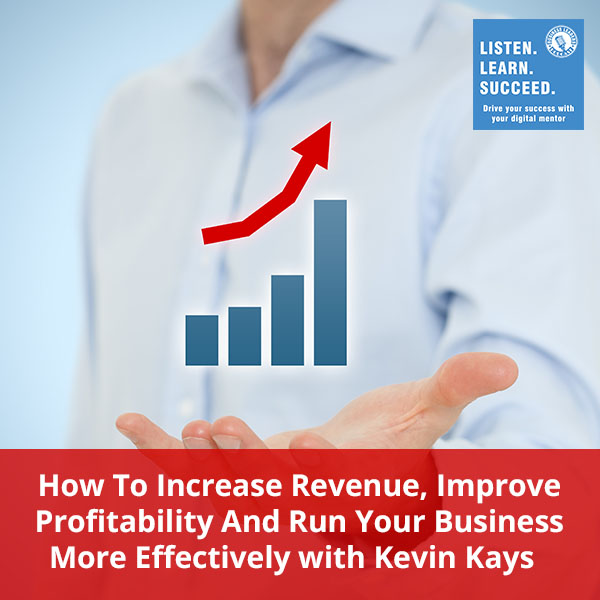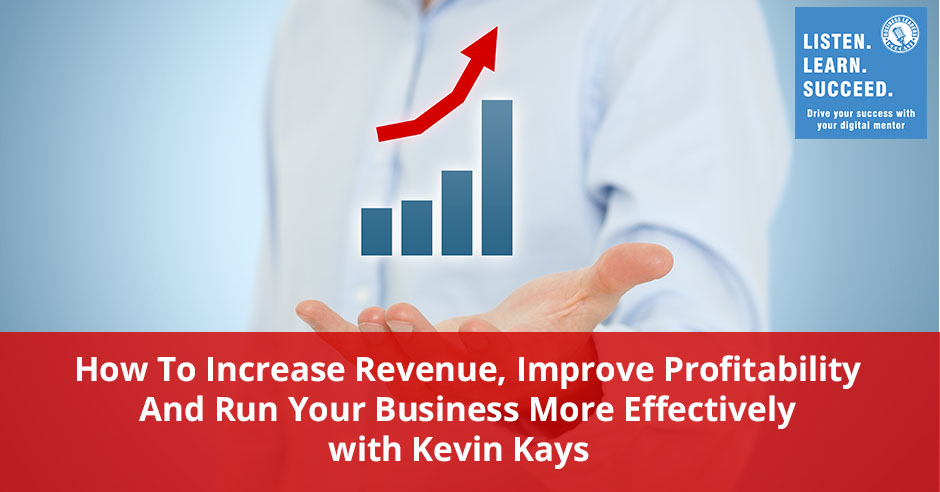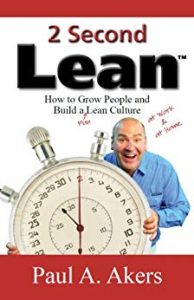How To Increase Revenue, Improve Profitability And Run Your Business More Effectively with Kevin Kays


At some point, business owners are responsible for the people that they’ve engaged because their livelihoods are dependent on their ability to run and to lead that business. Kevin Kays, president of The Alternative Board Denver North, helps business owners increase revenue, improve profitability, and lead their companies more effectively. Kevin shares what he does at The Alternative Board and how they help business owners run their businesses more effectively. He also touches on transitions, working with a business coach, behavioral assessments, critical success factors, and more.
—
How To Increase Revenue, Improve Profitability And Run Your Business More Effectively with Kevin Kays
We have Kevin Kays. He’s the President of The Alternative Board Denver North. Kevin, thank you so much for taking the time on this episode.
Thanks for having me.
Kevin, tell us a bit about your business and who you serve.
I own The Alternative Board Denver North and I work with entrepreneurs. I target folks who own and operate and actively involved in running their businesses that do gross revenues of about $1 million up to the $50 million range and larger. What I do is work with them to run their businesses more effectively so that they can identify their personal goals and translate them into their company goals. Use that to develop their strategy and implement it to get them where they want to be both personally and with the business.
I’m going to pretend I’m a business owner. I’ve been successful. I know everything I think that there is to know about my customer. I’ve been running the business for twenty years. I’m successful by almost everybody’s measure. You walked through the door. What should I expect?
What you should expect is for me to start asking you about where you are with your business and where you are with your life. What plan do you have not only for running the business but for leaving the business and monetizing that asset that you’ve spent your life building?
For many of the business owners, they think about leaving the business, “I have zero plan to leave my business. I’m going to work here until I die.” Why would that be of interest to the guy that says, “I’m never going to leave my business?”
The guy that says he’s never going to leave his business is deluding himself because he’s either going to leave it on his own power or leave it first. If he’s got a family that’s depending on him, he’s got a responsibility to make sure that that asset serves them one way or another after he’s gone. If he doesn’t plan for his exit and doesn’t plan for that asset to be of value to the folks behind him, he’s going to leave a colossal mess for them.
I saw a statistic that said after 2008 declined crash that two-thirds of the jobs created in the country were created by small business owners. Some of the business owners that’s been successful is interested in as employees as well.
One of the things I look for the individual that runs his or her business is to help them lead more effectively. I help them deliver on the plan that they need to make so that not only is the business doing well to meet their needs but meets the needs of their employees. At some point, you are responsible for the people that you’ve engaged because their livelihoods are dependent on your ability to run and to lead that business.
For the business owner, they might say, “I’m not going to take and sell my business. I want to transition it to my kid.” For that particular person, what types of things do you see that you bring to the table that help those folks?
Have the family members worked in the business? What responsibilities have they had? A particular case I worked with was where the entrepreneur who founded the business was transitioning into a daughter and he was becoming less and less able to interact with the business on a daily basis for some health reasons. I stepped in and coached and mentored the daughter as we grew the business and then moved it to an eventual successful sale. Those are the types of things where someone in my position as a coach can come in and help on a change of control to a new generation who may not necessarily have all the insight that I’ve gained in 40 some years of a professional career.
Sometimes the transition is not elective.
One of the things I work with individuals on is do we have the right mechanisms in place should something happen? If you get hit by a bus tomorrow, what’s going to happen in the business? Is there a continuity plan? Is there a partner? Is there a buy-sell agreement? Even as basic as, “Mr. or Mrs. Business Owner, do you have a will? Do you have a trust? Do you have an estate plan in place? All those things even down to do you have a durable power of attorney? Do you have a medical power of attorney to take care of your affairs if you’re not competent or you’re not around to do it so that the people who have to pick up the pieces and the business or with your family affairs are able to do that?”
 Run Your Business More Effectively: Business owners should better prepare for some of the things that they need to face in running and in exiting their businesses.
Run Your Business More Effectively: Business owners should better prepare for some of the things that they need to face in running and in exiting their businesses.
It sounds intuitive that you would think that this has done all the time.
One would think that, but I find in working with entrepreneurs is that you’re so busy in the day-to-day making sure I’m getting the sale that you need. Making sure you’ve got the right people and the right seats on the bus. Making sure the cashflow is there and that it’s the forest for the trees syndrome. A lot of my job is pulling them back and giving them the ability to take a bigger picture to look at their business. As well as the other piece of what I do along with the business coaching and exit planning which is running peer advisory boards. I get these individuals in with groups of other noncompeting business owners that they get to know with and they get to know well and work with on a monthly basis to help back each other up with, “What do I do when this happens? Has anybody ever had this experience? What do you think about this situation or that situation?” That’s just an invaluable tool for helping business owners better prepare for some of the things that they need to face in running their businesses and in exiting their businesses.
I think about the business owner. Let’s say that you’re in your mid-40s and you’re operating your business by your measures with many others. You’re successful. Why would that particular demographic or age range be interested in a coach?
The realization that they don’t know at all at some point is going to be critical. What I see frequently with people in that demographic is that they may have started the business by accident or may have just stumbled into starting the business because they left a job. They needed a job and they had a particular skill set. They started doing whatever it was they knew how to do and gradually it grew and turned into not only a livelihood for them but an actual business with employees, budgets, staff, in addition to the people on the front line. All of a sudden someone who’s good at carpentry or good at plumbing or good at writing software has a fair-sized business and they’re not sure what to do next. A big step for someone like that is when they realize the business is stagnant or the business is getting ready to grow and they’re not sure what their next steps should be.
The business owner’s perspective is from the business operator. I don’t think the business owner typically puts himself in the place of the business buyer.
A large part of what I do both in the exit planning and as a business coach is work with my client’s members to make the business less dependent on you as an individual. If they were hit by the proverbial bus, what happens? Is there a business continuity plan in place? Is there a buy-sell agreement in place with a partner or with the investors? A worst-case scenario would be if you have a partner in the business and you’re suddenly incapacitated. Your partner is in business with your heir whoever is responsible for your affairs whether they know anything about the business or not. If you’ve been working responsibly and you’ve developed either a continuity plan or a buy-sell agreement so that the partner is able to take control and run the business in your absence. That the business can survive as an entity that has some value. Trying to get it to the point where the business is not dependent on you as an entrepreneur, you as the person that’s there day to day managing it is a key part of what I work with my clients to do.
I’m a business owner. You walked through my door and we agreed that we’re going to engage your services. As far as the amount of time it would take and the initial first process, what should I expect?
The first thing that’s going to happen if you engage me as a business coach is I’ll do a behavioral assessment. It helps me understand what your motivators are, and it helps me understand your communication style. I happen to use DISC, which is one that I like. We use it system-wide and it’s very helpful. It helps me understand how to best communicate with you. Along with that, the next thing we’ll do is a personal vision. I’ll work with you to complete a fairly extensive set of questions as to what your wants are, what your needs are, what are the things that you can do in the business that would make a big impact on it? What do you like to do in your free time? How much free time would you like to have? If suddenly you won the lottery what would you like to do? What would you do with your time? What would you do with your family?
Moving farther down the road, what is your exit plan or do you have an exit plan? Those are all pieces that go into that. I work with you as a hypothetical client to determine what your personal vision is to develop a roadmap. It’s one thing to take some time off, jump in the car with your significant other and say, “Great. Now what?” As opposed to knowing where you want to go when you’re ready to leave. You have a plan. You’ve made the plan, you work the plan and you get where you want to go. I apply that same logic to people that I work with. It would be a matter of putting together your personal vision. Using it to develop the vision you have for your company that supports what your vision is because the company is your creature there to serve you. From there, we develop a strategy to get you where you want to go, to get the company doing what it needs to do to meet your personal vision. It’s basic blocking and tackling. What are your critical success factors? Small business long-term planning is three to five years. A lot of what we do is even shorter-term than that. What do you need to do in the next 90 days?
Make sure you know where you want to go and what you want to do.
How do you prioritize? Let’s say there’s a laundry list from soup to nuts. I don’t have the patience to work. I don’t have an intellectual property or whatever it is.
We take a look. What are your critical success factors? This is a good time to be planning what you’re doing next year. Let’s take a look at what your strategy is for the business or what your desire is for the business. What needs to happen between now and this time next year to get you in the direction that you want to go? Let’s pick three or four most important things and let’s start working on those and break them down into pieces. There’s the strategy. Let’s start planning. Let’s start to develop the strategy and then the tactics. What do you need to accomplish this month? What do you need to accomplish in three months? What do you need to accomplish in six months?
I come in as a coach and not as a consultant. It’s a very different thing. The consultant comes in and tells you what they think you should do and leaves a report, takes their check and say, “Thank you very much,” and they’re gone. They come back in six months or a year. You won’t have done much that they recommend if any. A coach is there day in, day out every month or more often and works with you as the business owner to develop what the strategy should be. In that way you have ownership. In that way, you have accountability not only to me as a coach. If you’re part of a peer advisory board, you’re accountable to several other business owners every month as to what it was you said you were going to do to fix an issue to achieve a goal. That is going to be important in getting you to where you want to go.
You got the consultant-coach issue. You have an assessment of the owner where he wants to go. You have an assessment of the company and where there’s the vision. How do you interact with some of the key members of the team that’s not the owner?
It’s at the option of the owner as to how we choose to do that. In cases where it’s a small team, I’m dealing directly with the owner and that’s an hour sometimes more of individual time once a month, as well as a morning or an afternoon spent with other business owners who serve as an informal board of directors. If it’s a team and I’m engaged to come in in that area, I work with them as far as setting the actual company strategy. I’ll do strategic reviews. I can come in and do quarterly reviews, but I also am sometimes retained to coach the individual managers, executives or department heads. Even within a smaller business on their leadership skills, their management style, their planning and their implementation.
In the ideal circumstance, you’ve got a business on bringing you on board and it burned out a little bit. They start seeing the company be congruent with their vision and then it starts to grow, and the fund starts to come back in the business. What types of things do you see those types of owners do when they rediscover the joy of their business?
They’ll re-engage with the business and they will find new avenues to outlets for their creativity in the business. Maybe they’ll take it in a new direction. Sometimes they choose to like, “I’m engaged with the business, but the business is doing what I needed to do. Let me explore some other avenues. Maybe I want to start a new business on the side. Maybe I want to spend more time with my family.” I look back at some of the success stories I’ve had. I worked with an individual who when I started working with them was easily clocking 60-plus, 70 hours a week. He had a couple of small kids.
After I’d been working with them for about a year, in one of our sessions, he said one of the most important things that had happened to him over the course of the year was instead of just taking Sunday afternoon off, he was taking the full day. As well as half day during the week to spend time with his two small boys. Eventually, he sold his business for a significant multiple. One of the biggest wins in that whole process was making it so that he felt comfortable walking away from the business for a little more time during the week to get some family time with small children. You don’t get that chance again.
I’m the business owner and I get an unsolicited offer to buy my company. Is it typical or atypical for you to get brought in that case to help them evaluate or maybe consider?
I’m going through that with an ongoing TAB member of mine that I had been coaching for a little over a year who’s dealing with a couple of unsolicited offers through his business. Are they the right offers? We don’t know. It’s early days yet but I had the advantage. They’re already being involved as a business coach and helping through my connections and through the other people that I work with. I’m getting the right people in place to help advise him. What do I need to do? How much do I disclose? What is the agreement need to look like as far as nondisclosure? What are the questions I need to ask? What are the things I need to do on the financial side to make the best representation of my company? What do I need out of the business from the financial side to make it worthwhile for me to sell it and what’s my walkaway point? Those are all issues that we’re addressing in present. If business owners are thinking strategically even if they haven’t engaged someone to help with that, they have someone on tap that they can go to if it happens. It’s always better to be prepared and be proactive than it is to be reactive in a situation like that.
 Run Your Business More Effectively: It’s always better to be prepared and be proactive than it is to be reactive.
Run Your Business More Effectively: It’s always better to be prepared and be proactive than it is to be reactive.
How would you characterize their understanding of the various avenues to sell the company that is available to them?
I would say that it’s fairly limited because they’ve spent their lives developing business and they know more about that particular business than most other people do. They don’t necessarily know the best way to maximize the value in their business and prepare it for sale. That’s why the specialties have developed an exit planning and investment banking and mergers and acquisitions. There are people who focus on doing the best deal possible. That’s not something your average business owner knows. He or she is only going to deal with that one to maybe a handful of times in their life as opposed to professionals who have dealt with it on an ongoing basis. It’s very different. You’re not going to perform surgery on yourself. If you’re smart, you’re not going to write your own legal agreements. You’ll find a professional who works with that thing. You may be the best there is at running your particular business but it’s not reasonable to expect that you’re going to be an expert in doing something that you’ve never seen before.
I think about the chagrin of the business owner that says, “I don’t need outside advice. I’m going to sell the business. I’ve got an offer.” In review, they have no idea whether it was under market, at the market or above market. They just have no idea.
One of the situations that we see is asking a business owner, “How much do you think the business is worth?” They’ll give you a figure. You’re like, “How did you get there?” They’ll say, “The last time I went into to renew my line of credit with the bank, they asked me how much I thought it was worth. I said X and they said okay. They didn’t question it.” Of course, they didn’t question it. They were looking at your financial statements. They knew what they needed to know. The next time you go in somewhere like, “What’s your business worth?” “My banker thinks it’s worth X,” or “My neighbor down the street thinks it’s worth X because he sold his business for Y.” It develops its own momentum.
Within the business owner’s head, they fix on a particular value and there’s a lot of emotion involved in it. A potential buyer whether it’s an economic buyer, a strategic buyer or what have you, there’s no emotion there. They’re looking at it from strictly a business standpoint. They’re looking at what the multiples are. They’re looking at the book of business. They’re looking at the intellectual property if there is any. That’s how they’re going to base their decision. They don’t give a rat’s back end of the blood, sweat and tears that you put in the business or what you think is worth.
One of the saddest situations I ran across was with a fellow that I met. He had been running a business for a number of years and had some health issues. He had to step away for a while. His lieutenants did okay running the business. He came back and met with him and he said, “I’ll sell the business in a few years but I’m okay for now. The guys who are running the business for me are going to buy it.” I get a call from him, “Do you know anybody that would like to buy my business? I want to go ahead and sell it.” I was like, “I thought you were going to sell it to the guys inside?” He said, “They don’t have the ability to buy it.”
I said, “Tell me about the business. Tell me about the clients.” He said, “There’s only one major client left. The rest of them had left over the period of time and the business had gradually spiraled to get smaller and smaller.” I sent a couple of people his way, but I didn’t hear any more about him until I saw the ad and the auction for the equipment. I saw that the real estate had been sold. The ongoing concern ultimately winds up being worth the auction value of the equipment and the value of the real estate. That’s a lifetime of building a business that went for auction value because of a failure to plan.
Have a good idea of what it is you need to get done that day, that week, that month, and execute it; otherwise, it doesn’t get done.
That happens more often than most business owners realized or the failure to transact because the business owner has one value in mind and the buyer looks at that then go, “The math doesn’t support your premise.” Moving on a bit before we leave this topic, the business owner is going like, “I need to take and have this conversation.” One, how much time does it take for me to take in and start going down this road?
Normally, when I engage with somebody as a business coach on the TAB side, it will be a couple of hours on the front end because there’s a lot of work involved. The assessment as quick as fifteen or twenty minutes on the computer but working with your personal vision is an in-depth process. It requires a lot of thought particularly if you’re married or if you’re in a long-term relationship. Your spouse or partner needs to be involved in that because you’re talking about the major asset. You’re talking about what your life plans are. You don’t want to be the one whose idea of the perfect retirement is sitting in the cabin on a lake while away from civilization. Your husband, wife or partner would love to just buy an RV and travel the country. You need to talk about that stuff sooner rather than later.
The front end is a couple of our commitment. As things get going, if I’m working with an entrepreneur, they can expect to spend about an hour a month with me individually or more time if necessary. We can negotiate that. If they’re involved in the peer advisory board, they set aside a regular morning or an afternoon once a month. It’s about four hours to get together with a group of noncompeting business owners. That gives them an opportunity to talk about the challenges, the problems, the opportunities that they face in running and growing their businesses.
For the business owners who say, “I need to reach out and talk to you.” How do they find you on social media?
I am available on LinkedIn. You can search me under my name. I have my own website, TabDenverNorth.com and that’s also linked to my LinkedIn page. Those are the easiest ways to find me.
We’re going to shift gears a little bit. What’s a reading material or a recent book that’s altered your perception of what you bring to your business, what you bring to your customers? Any book that sticks out?
 2 Second Lean: How to Grow People and Build a Fun Lean Culture
2 Second Lean: How to Grow People and Build a Fun Lean Culture
It’s one that we just discussed. One of the books is what one of my members suggested, it’s by a manufacturing guy. It’s called 2 Second Lean. When you first look at it you’ll think, “It was written by a manufacturing guy and it’s all about manufacturing.” It’s not. It’s more about process and planning. It’s a typical business book. It’s an easy read. You can read it on a short flight from here to Chicago or from here to LA. It’s easily read but it gives you several valuable nuggets on how to be better at what you’re doing. It’s even as simple as, “Let’s clear your workspace every morning. Let’s make sure we know where everything is. Let’s make sure we know what it is we’re going to work on that day.” That’s got applications for everything from people who are running a machine shop to people who are running a digital media agency. Let’s make sure everyone’s clear on what they’re doing. Let’s make sure that they have what they need. Let’s make sure that there’s consistent availability of the tools and the resources they need to get it done. I can’t recommend it enough.
What’s a challenge or a failure past that served you well and set you up for your current achievement?
One of the things back in my actual working for wages days as opposed to working on my own was I got hired to do a job and I made the mistake of doing what I was told I was supposed to do. To me, that was a failure on my part of reading between the lines and assessing the situation correctly. I went in and started doing what I’d been told I was hired to do, and it was a terrible experience. It was painful for the people that hired me. It was painful for me because I was doing what I knew how to do and what the expertise that I have was telling me to do and that was not at all what they wanted. That taught me particularly in dealing with individuals. If I’m dealing with an entrepreneur, it is about them. It is about what you want but let’s talk at some length and dig to make sure that what you’re telling me you want is what you want and what you need. Sometimes what you need is not what you think you want.
If you could put an ad on page one of the local business paper sharing your message, what would it say and why?
It would say, “If you want to change your life for the better, plan your work and work your plan.” Many people go through lives, they go through their businesses without figuring out what it is they want and without working in the direction. There’s a lot of wasted time. There’s a lot of wasted effort. A lot of tears and heartbreak could be avoided by sitting down first and figuring out what it is you want to do and what it is you need to do and then doing it. Start with the end in mind.
What I tell people is when you’re building your life plan, when you’re building your business strategy and the plan to get you there, keep in mind that if you’re on a sailboat, you’re not going to go in a straight line. You’ll get there but sometimes you’re headed even almost 90 degrees to where you need to go because you have to make constant course corrections. You have to adjust to the conditions. You have to adjust to the wind, but you’ll still get where you want to go. It may not be as fast as you’d like it to be, but you’ll get some different experiences. You’ll learn some interesting things but ultimately if you’re still working the plan and you know where you want to go, you’ll get there.
Lead people in the direction that they need and want to go to.
What’s the best allocation of time or initiative that’s helped you or your company most?
The best allocation for me is making sure every day I know what I’m going to do. If there’s a day where I haven’t set out in the morning what it is, I’m going to do or a week where I haven’t set out what I’m going to do, I’ll look back at the end of the day or the end of the week saying, “What did I accomplish this week?” I was really busy but I couldn’t tell you what I got done.
If somebody said you had an unusual habit, what might others consider a little bit out of the ordinary that’s helped you and/or your company the most?
In some ways, I’m a bit of a savant because I retain a lot of what is generally useless information. I’ve never figured out how to monetize it but every now and then in that pile that’s stored in there, something pops out that makes a situation suddenly crystal clear. Inventory of stuff coupled with a rather dry and offbeat sense of humor.
What’s a belief or protocol that you’ve established in the company that’s most impacted your success?
I’d say it’s a belief particularly working as an individual in the coaching and consulting range. We all do too much rework and we tend to underprice ourselves. The one thing that has helped me in my business is realizing my time and my expertise as a value and not to sell myself short.
We have a tendency to discount that which we know.
We do. It may be easy for me or it’s crystal clear to me like, “Let’s just go have lunch, we can fix that.”
The man has taken 30 years to figure it out. People universally underpriced.
I look at it that I have spent 40 years paying tuition. If there’s a mistake that’s been made, I either made it or cleaned up after it or at least seen it and that’s a valuable experience.
It’s a short circuit and that’s why they hire a coach getting better quicker. What’s the advice you’d offer to a new CEO that’s assuming the role of CEO for the first time?
If you are the CEO and if you’re the owner, then the advice I would give you is to make sure you know where you want to go and what you want to do. Also, make sure you know who’s on your team and that you understand what your company’s value proposition is. If you are a CEO and you are not the owner, then make sure that you and the people that you answered to are on the same page. In the cautionary tale, I told of making sure that you’re doing what they want you to do versus what they tell you they want you to do is something to pay attention to. The old story of the recruiter who’s placed three or four hires at one company and they’ve all been placed there because the board of directors or the CEO said, “I want somebody to come in and hit the ground running and make a lot of great changes from day one.” Within 90 days or six months, they’re out the door. Until finally the recruiter places somebody in there and said, “I want you to go very slowly. Don’t make any changes in the first 90 days.” Following up with the CEO saying, “This guy is great. He’s what we wanted all along because he wasn’t making any changes.” The changes he made were very slow and very incremental after he got the lay of the land.
What’s the most common misconception about you or your role as the owner of your company?
The most common misconception is that I come in as a consultant as opposed to a coach. A coaching role is very different from the consulting role. I will consult, I do take consulting assignments, but I draw a very bright line that if I’m going to consult, I’ll tell you that I’m going to consult. I’ll make sure you’re okay with that. I’m also going to be a real pain about making sure that if we come to a decision on that, that you’re still involved even though I’m consulting and that you are going to commit to doing what it is we suggest.
 Run Your Business More Effectively: A coaching role is very different from the consulting role.
Run Your Business More Effectively: A coaching role is very different from the consulting role.
Looking back over the past few years, what would or should you have said no to and why?
Both in this business and in other businesses, the recognition that not all business is good business for me is a tough one to make. Both when I was selling for other people. Granted I’m a coach but a lot of my business is selling. If I don’t sell it, it doesn’t happen. I don’t get the engagements, I don’t get the members and the clients. The realization that because someone thinks or understands that they need me, maybe it’s not a good fit. Maybe my approach isn’t right for them. Maybe my personality is not right for them. What I do now with TAB and with the peer advisory boards, I also have to be sensitive to a group dynamic. I can’t bring someone into a TAB board that’s not going to be a good fit for them. Sometimes I will agree to work with people individually because they’re not a good fit for a board. I can tell fairly in the process if I’m not a good fit for them, so I’ll decline the business or I’ll refer it to someone else I think can help them that’s a better fit. Making that recognition earlier on would have been helpful. Not all business is good business.
You are in the day-to-day operation of the company. What’s a personal habit or self-talk dialogue that keeps you focused?
It’s the realization that if I don’t do it, it’s not going to get done. I choose to work individually. I don’t have partners. I occasionally hire support and contract basis from time to time but it’s making sure that I stay organized. It’s making sure that I have a good idea of what it is I need to get done that day, that week, that month and execute it. Otherwise, it doesn’t get done.
Look in the mirror every morning and figure out why not.
My boss tends to stalk me and I can’t get away from it. I see him in the mirror every morning and sleeps with me at night. It’s just everywhere I go. I look in the rear-view mirror and there he is.
What’s a quote that you find meaningful or one that you use frequently?
I don’t know where this came from but one that I use frequently with my clients and with my members is, “The perfect is the enemy of good enough.” Oftentimes I’d be working with someone who’s like, “It’s not quite right. I can’t do it.” How much more information do you need? We have enough information to make a rational informed decision. Granted that it’s not perfect but it’s good enough.
If I was to talk to your colleagues and ask them what you’re best at, what would they say? How do you utilize that strength on a daily basis?
People I work with and colleagues, as well as clients, would say the thing that I bring to the table that helps the most aside from years of experience is an ability to listen. It’s the ability to formulate on the fly like, “Here’s what I understand you’re telling me. Let’s make sure this is right.” Follow up with a line of questions and some of is Socratic like, “How do you feel about this? What do you think is the best course of action here? Why have you chosen to do this or why would you not do this?” Lead people in the direction that they need and want to go to. A lot of it is listening skills.
You going through this process is a pet project. I love the idea of helping business owners maximize the value of their companies and execute well.
It’s a very psychically rewarding field.
For the business owner that’s reading, the biggest mistake they can make is by not calling. Reach out and get some coaching. Make sure you give Kevin a call and bring him on board. I appreciate you taking the time and sharing your wisdom. Thanks so much.
Thanks.
Links Mentioned:
- The Alternative Board Denver North
- LinkedIn – Kevin Kays
- TabDenverNorth.com
- LinkedIn – The Alternative Board Denver North
- 2 Second Lean
- https://www.TheAlternativeBoard.com/Denver-North
About Kevin Kays

Kevin Kays is CEO and owner of The Alternative Board Denver North (TAB). He founded TAB Denver North in 2012, servicing the north metro area along the Front Range to Longmont and Berthoud. He’s worked with local companies from a diverse set of segments including hospitality, legal services, manufacturing, construction, education, and IT.
Kevin brings over 30 years of diverse business experience to TAB. He’s been a partner in an investment firm and in a competitive intelligence practice. His experience includes M&A, financial management, sales and marketing management, finance, and territory sales. He’s worked for companies such as Brunswick, the College for Financial Planning, TRW Information Systems (now Experian), CIT Financial, and forerunners of both US Bank and Wells Fargo in the Colorado market.
Through the years Kevin’s developed an appreciation of what works and what doesn’t in business, both large and small. He’s devoted to helping business owners improve their top line, bottom line, and quality of life through coaching and shared collective wisdom from their peer advisory boards.
A long time area resident, he was born in Illinois and grew up in Colorado and Wyoming, ultimately attending high school and college in Virginia. He returned to Colorado after college, and has remained in the Denver area for most of the past 35 years.
Kevin earned a BA in history from the College of William and Mary in Virginia, and an MBA from Regis in Denver.
Love the show? Subscribe, rate, review, and share!
Join the Business Leaders Podcast Community today:
- businessleaderspodcast.com
- Business Leaders Facebook
- Business Leaders Twitter
- Business Leader LinkedIn
- Business Leaders YouTube
The post How To Increase Revenue, Improve Profitability And Run Your Business More Effectively with Kevin Kays appeared first on My podcast website.